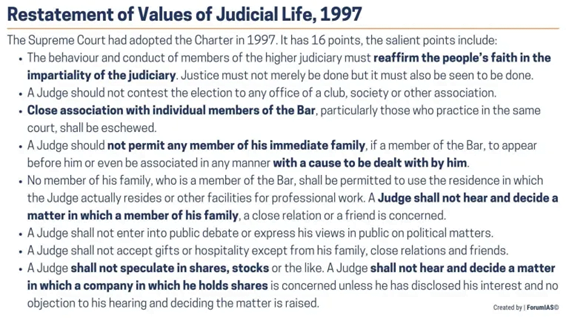Governance
Context: In recent times, Judicial accountability and judicial independence are seen as the opposite concept but it is necessary to ensure a balance between them.
Meaning of Judicial Accountability:
- The term judicial accountability means that the judges are responsible for the decisions they deliver. It also means that Judges be held accountable for their conduct.
- The Judiciary is not subjected to the same level of accountability as the Executive or the Legislative wings of the Government.
- The reason is that the principles of Judicial Independence and Accountability are sometimes regarded as fundamentally opposed to one another.
- Judicial independence is considered ‘an essential pillar of liberty and the rule of law’. So, if Judiciary is made accountable to the Legislature or the Executive it will impact its Independence. So special provisions have been provided to ensure judicial accountability.
Provision of Judicial Accountability:
- The Constitution of India provides for the removal of the judges of the Supreme Court of India (Article 124 of the Indian Constitution) and the High Courts (Article 124) for misbehaviour and incapacity by means of impeachment.
- Article 235 of the Constitution provides for the ‘control’ of the High Court over the subordinate judiciary.
- It provides an effective mechanism to enforce the accountability of the lower judiciary.
- In 1997, the Supreme Court of India adopted a Charter called the Restatement of Values of Judicial Life.
- The behavior and conduct of members of the higher judiciary must reaffirm the people’s faith in the impartiality of the judiciary.

Need to Enhance Judicial Accountability:
- Speedy Justice: Speedy justice is not only our fundamental right but also a prerequisite for maintaining the rule of law and delivering good governance.
- Impartial Functioning: It will help in ensuring an impartial functioning that would augment public trust in the institution of the judiciary.
- No Legal Obligation: Unlike the executive, the judiciary is not under any legal obligation to prepare annual reports or table them before Parliament or the State Legislature.
- Guardian of the Constitution: Judicial accountability is more important, as the derogation of values in the judiciary is far more dangerous than in any other wing of the government as the judiciary has to act as the guardian of our constitution.
- Narrow scope of the RTI: The scope of information which the courts are willing to share under RTI is not too wide.
- Public Confidence: The judiciary as an institution needs to preserve its independence, and to do this it must strive to maintain the confidence of the public in the established courts.
- Not under the direct control of SC: Under our constitutional scheme the high courts are autonomous constitutional bodies not subject to administrative directions of the Supreme Court.
Challenges in enhancing Judicial Accountability:
- The most important challenge for the regulation of judicial accountability is that the judiciary is an independent organ and the independence of the judges cannot be done away with.
- Any attempt to make the Judiciary accountable to the Legislature or Executive will make it susceptible to external pressure. It is very difficult to balance the Judicial Accountability vis-a-vis Judicial Independence.
- There exists no other way in which a judge can be removed except through impeachment and the process is long and complex.
- Due to this, it is difficult to augment judicial accountability. Again, the process can’t be diluted as it will impinge on judicial independence.
- Moreover, the SC and HC have the power of contempt that prevent imposition of anything on the judiciary without their consent.
- The judiciary is the final interpreter of laws, policies, rules etc. and can easily strike down anything as per its will.
Way Forward:
- The Supreme Court should be entrusted with direct responsibility for the functioning of the high courts.
- Only then can the highest court be an effective apex court, only then can the Supreme Court be made answerable, as it should be, for judicial governance for the entire country.
- Judges of the court must make annual financial disclosure statements, not privately to their respective chief justices, but publicly as done by the world’s oldest democracy, the USA.
- Judges must set an example for ministers, central and state, for members of Parliament and of state legislatures, and for all high officials of government, to follow.
- Judicial accountability should be ensured by enacting a law on the lines of the American model.
- Lot of care needs to be exercised so that the anti-corruption measures taken do not undermine the independence of the judiciary.
The actual challenge is to grant as much judicial independence as is necessary to have cases adjudicated impartially and neutrally. Maintaining this equilibrium between accountability and independence is the real task at hand.
Source: Indian Express
Previous Year Question
Q.1) With reference to Indian Judiciary, consider the following statements.
- Any retired judge of the Supreme Court of India can be called back to sit by the Chief Justice of India with prior permission of the President of India.
- A High court in India has the power to review its own judgement as the Supreme Court does.
Which of the statements given above is/are correct?
- 1 only
- 2 only
- Both 1 and 2
- Neither 1 nor 2












